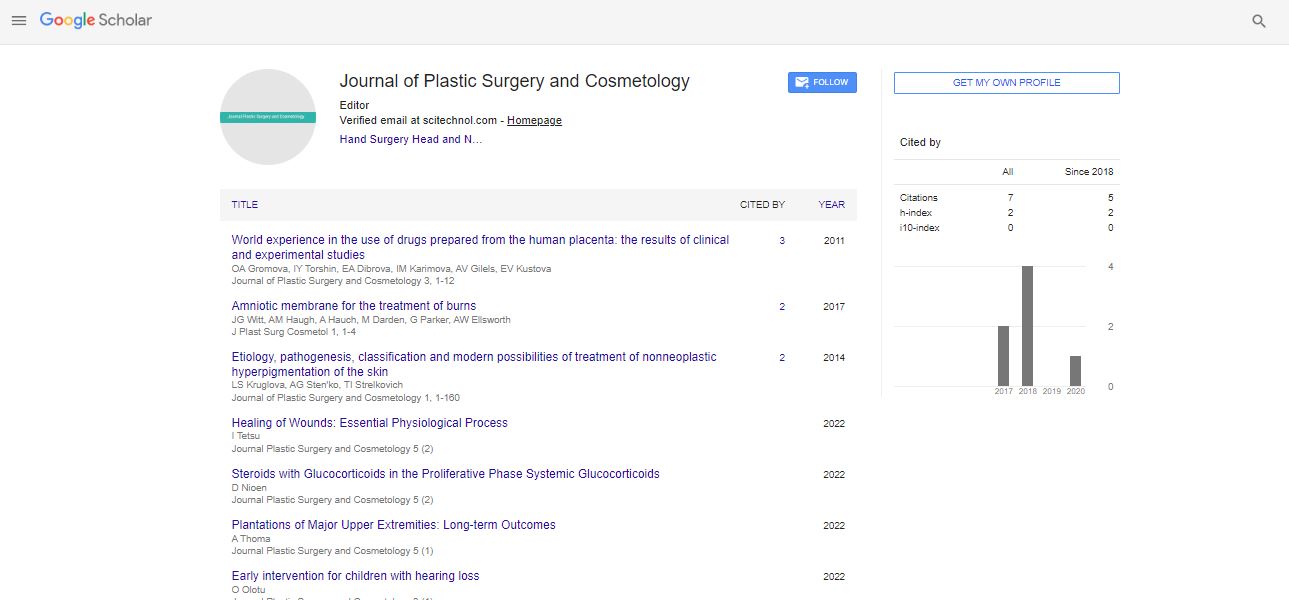Perspective, J Pls Sur Cos Vol: 12 Issue: 4
Psychological and Social Dynamics of Cosmetic Surgery: Navigating Self-Esteem, Body Image, and Societal Perceptions
John Hircorck*
1Department of Surgery, McMaster University, Ontario, Canada
*Corresponding Author: John Hircorck,
Department of Surgery, McMaster
University, Ontario, Canada
E-mail: Hircorckjohn23@gmail.com
Received date: 27 November, 2023, Manuscript No. JPSC-24-123952;
Editor assigned date: 29 November, 2023, Pre QC No. JPSC-24-123952 (PQ);
Reviewed date: 14 December, 2023, QC No. JPSC-24-123952;
Revised date: 21 December, 2023, Manuscript No. JPSC-24-123952 (R);
Published date: 28 December, 2023, DOI: 10.4172/JPSC.1000070
Citation: Hircorck J (2023) Psychological and Social Dynamics of Cosmetic Surgery: Navigating Self-Esteem, Body Image, and Societal Perceptions. J Pls Sur Cos 12:4.
Description
Cosmetic surgery, once a niche practice, has become increasingly prevalent in contemporary society. As individuals seek to align their physical appearance with personal ideals and societal standards, the decision to undergo cosmetic surgery is influenced by complex psychological and social dynamics. This essay investigates the multifaceted aspects of cosmetic surgery, delving into the psychological underpinnings, the impact on self-esteem and body image, and the interplay with societal perceptions. The decision to undergo cosmetic surgery is often rooted in an individual's selfperception and self-esteem. Perceived physical flaws or dissatisfaction with certain features can impact self-esteem, leading individuals to seek surgical interventions as a means of improving their self-image. Cosmetic surgery becomes a tool for enhancing self-confidence and achieving a more positive self-concept.
Social comparison theory posits that individuals evaluate themselves in relation to others, and the pervasive influence of media exacerbates this phenomenon. Images of idealized beauty portrayed in media can contribute to unrealistic standards, fostering a desire for physical transformation. Cosmetic surgery may be seen as a means to align one's appearance with these societal ideals, driven by a desire for social acceptance and belonging. The relationship between cosmetic surgery and emotional well-being is complex. While some individuals experience a boost in mental health and a reduction in psychological distress following successful procedures, others may grapple with unrealistic expectations or post-surgical dissatisfaction. The psychological motivations for cosmetic surgery are intertwined with emotional well-being, and understanding these dynamics is crucial for comprehensive patient care.
Body Dysmorphic Disorder (BDD) is a psychological condition characterized by an obsessive focus on perceived flaws in appearance. Individuals with BDD may seek cosmetic surgery repeatedly, often without achieving satisfaction. Recognizing the presence of BDD is essential for surgeons, as these individuals may require psychological interventions in addition to or instead of surgical procedures. The impact of cosmetic surgery on body image varies among individuals.
While some experience heightened body satisfaction and improved self-esteem, others may struggle with post-surgical adjustment and perceive new imperfections. Managing post-surgical body image is a dynamic process that involves not only the physical outcomes of the procedure but also the psychological adaptation to the transformed appearance. Cultural and societal influences play a significant role in shaping body image ideals. Societies with a strong emphasis on physical appearance may contribute to heightened body dissatisfaction and drive the demand for cosmetic procedures. Conversely, cultural shifts toward body positivity and diversity may influence individuals to embrace a broader range of body types, potentially mitigating the perceived need for surgery.
Despite the growing acceptance of cosmetic surgery, social stigma and judgment persist. Individuals who undergo cosmetic procedures may face scrutiny, criticism, or accusations of vanity. Societal perceptions can contribute to feelings of shame or secrecy among those considering or undergoing cosmetic surgery, impacting the decisionmaking process and post-operative experiences. Media representation, particularly in celebrity culture, contributes to societal perceptions of cosmetic surgery. High-profile individuals openly discussing their procedures may influence public attitudes, either normalizing cosmetic interventions or perpetuating unrealistic beauty standards. Media literacy and critical engagement are essential for individuals navigating societal expectations and making informed choices.
Gender dynamics play a significant role in the social perceptions of cosmetic surgery. While societal norms have traditionally placed more emphasis on women's appearance, the landscape is evolving, and men increasingly seek cosmetic procedures. Gender expectations and stereotypes influence how cosmetic surgery is perceived based on societal norms regarding beauty standards, aging, and genderappropriate appearance. Ethical considerations in cosmetic surgery emphasize the importance of informed consent and shared decisionmaking. Surgeons play a pivotal role in educating patients about realistic expectations, potential risks, and alternatives to surgery. Empowering patients to make informed choices aligns with ethical principles and contributes to positive psychological outcomes. Integrating counseling and mental health screening into the preoperative process is crucial for identifying individuals at risk of psychological distress or unrealistic expectations. Mental health professionals can collaborate with surgeons to ensure that patients are emotionally prepared for surgery and possess a healthy understanding of the potential outcomes.
Cosmetic surgeons and the broader healthcare community have a responsibility to promote positive body image and celebrate diversity. This involves challenging societal norms that perpetuate narrow beauty standards and encouraging a more inclusive representation of beauty. By fostering a culture of acceptance, practitioners contribute to a more supportive environment for individuals considering or undergoing cosmetic procedures. The decision to undergo cosmetic surgery is deeply embedded in psychological, social, and cultural dynamics. Individuals seeking these procedures are influenced by a complex interplay of self-perception, societal ideals, and emotional well-being. While cosmetic surgery can contribute positively to self-esteem and body image, ethical considerations and patient empowerment are paramount in ensuring positive outcomes.
 Spanish
Spanish  Chinese
Chinese  Russian
Russian  German
German  French
French  Japanese
Japanese  Portuguese
Portuguese  Hindi
Hindi 